The 14 Best Learning Management Systems for Extended Enterprise Training
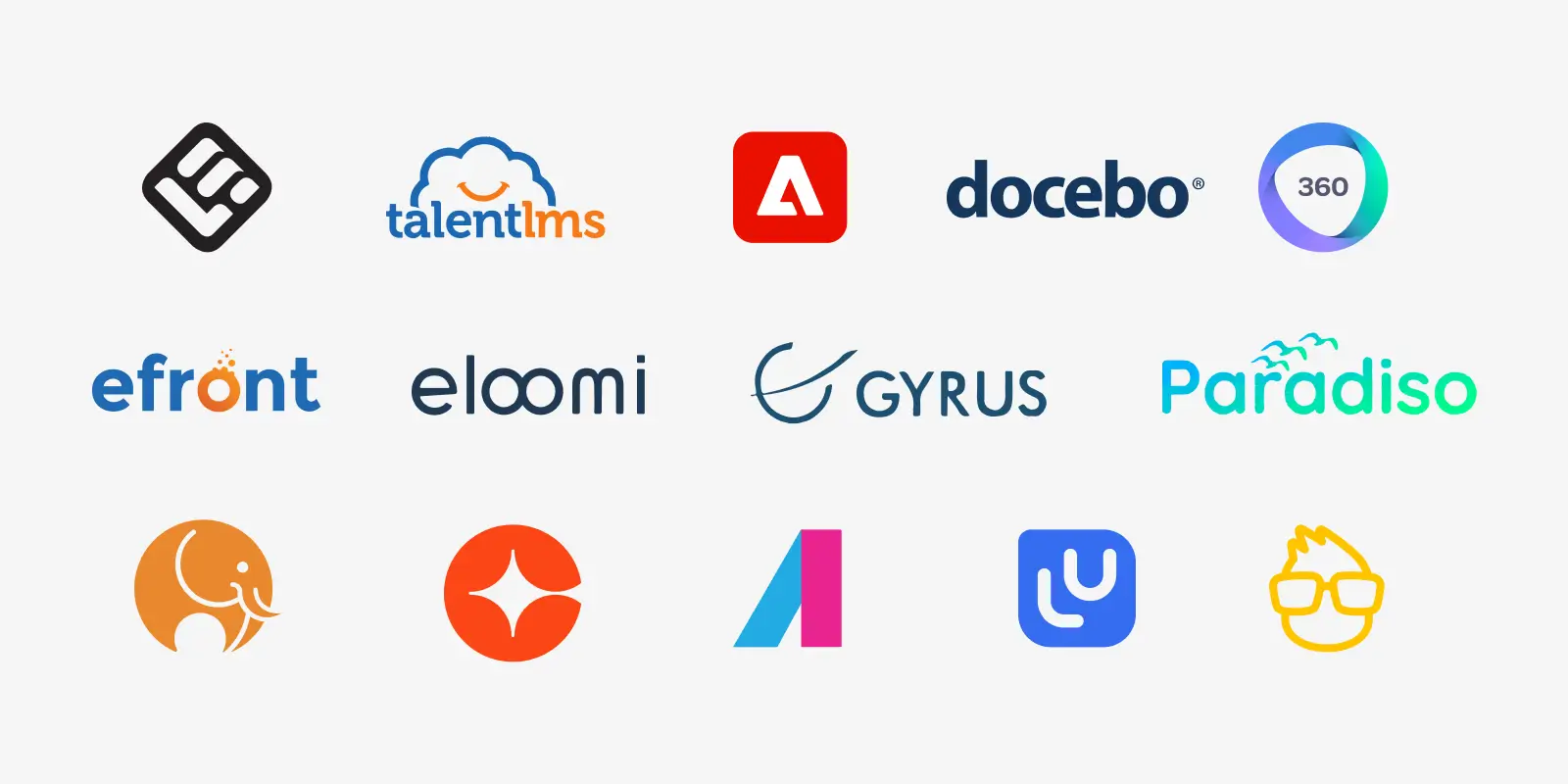
Table of Contents
Extended enterprise training refers to training programs addressed to stakeholders outside of your company, like customers, franchisees, vendors, consultants, contractors, and channel partners (like resellers, suppliers, or distributors).
Depending on whom it addresses, this type of training aims to help participants better understand your product or service, company processes, corporate values, and what your brand stands for.
Extended enterprise training can take many forms, too: product knowledge, customer education, patient education, compliance, safety, and business ethics training are just a few examples.
Unlike the typical employee training program, extended enterprise training tends to be more complicated and multi-layered. It addresses different audiences with varying needs and preferences, and it’s often deployed at a large scale.
And, very often, this type of training is not mandatory. Learners sign up for the training of their own volition and can just as easily quit it. Whether they’ll stick to the end or not depends on whether they’ll find true value and engaging content.
To meet these unique requirements of extended enterprise learning, companies are pivoting from on-site training programs to a more scalable and flexible solution – online training via a Learning Management System (LMS).
If you’re looking for the best LMS platform for extended enterprise training, this post can save you tons of time researching.
We have identified the top 14 Learning Management Systems (LMSs) for extended enterprise training. These platforms have demonstrated the ability to meet your needs and facilitate the growth of your organization through effective training.
Prior to reviewing the list, we strongly recommend reading about our platform selection process, familiarizing yourself with the advantages of extended enterprise training, and understanding why an LMS is the ideal solution for this purpose.
9000+ brands trust LearnWorlds to train their people, partners & customers.
Start a FREE Trial- Benefits of Extended Enterprise Training
- The Importance of Using an LMS for Extended Enterprise Training
- Criteria for Selecting an Extended Enterprise Learning Management System
- Top 14 Learning Management Systems for Extended Enterprise Training
- 1LearnWorlds – the best extended enterprise LMS
- 2TalentLMS
- 3Adobe Learning Manager
- 4360Learning
- 5Docebo
- 6GyrusAim
- 7Tovuti LMS
- 8Cornerstone Learning
- 9LearnUpon
- 10Litmos
- 11Absorb
- 12eFront Learning
- 13Eloomi
- 14Paradiso
Benefits of Extended Enterprise Training
Extended enterprise addresses different audiences and, as a result, it brings benefits to different areas of the business.
Customer training, for example, helps new customers how they can start using the product (onboarding), all possible use cases, and some basic troubleshooting. This can significantly improve their customer experience and increase product adoption.
Over time, customer satisfaction and relevant metrics, like your NPS score, will also improve.
An effective customer education program will also reduce the number of incoming tickets and take some work off your customer support team.
As for external partners, they’re better equipped to demonstrate the product or service and impart their enthusiasm, therefore selling it more effectively – both faster and to more clients than they would have if they did not receive training.
In this case, external partners are also better aligned with the company image and business ethics. Therefore, they don’t only reinforce your brand but also represent it in an optimal way. This is all the more important for franchisees who – in the mind of the customers – are one and the same as the parent company.
Why is an LMS Crucial for Maximizing the Impact of Extended Enterprise Training?
Extended enterprise training is usually deployed at a large scale, depending on the size of a company’s external network of stakeholders (e.g. partners) and customer base.
It’s not just about a single training program.
You have to consider implementing diverse online learning programs tailored for customers, non-employees, and external partners, encompassing various subjects such as: product knowledge, sales skills, customer service excellence, technical skills and troubleshooting, compliance and regulatory guidelines, leadership and management development, supply chain management, problem-solving and decision-making skills, and many more essential competencies.
Below are several key areas to consider, where you can place your trust in an LMS to deliver highly effective extended enterprise training.
Streamlined training
An extended enterprise LMS can simplify this multifaceted endeavor by providing you with a centralized cloud-based location where all the training material is stored and organized into separate training courses, and where trainees can “meet” to attend real-time training sessions as and if needed.
With a scalable LMS, you can build as many courses as you need and have an unlimited number of users.
Flexible content delivery
When it comes to delivering training content, the flexibility of an LMS platform is unmatchable.
Trainees can either complete the training at their own pace, join a cohort-based program, or follow a mix of synchronous and asynchronous learning (blended). Some may even attend on-site and some online (hybrid).
You can shape your training programs as you like, with webinars, ILT sessions, and downloadable resources to meet your audience’s needs and preferences.
Reduced cost & hassle
Another major advantage to consider is that using an LMS to deploy extended enterprise training eliminates all administrative and budget concerns related to organizing on-site training, like booking a revenue, arranging accommodation and transfers, and finding the best possible dates. Therefore, apart from making it far easier to organize training initiatives, an LMS also dramatically reduces the cost.
Engaging content
On the educational side of things, most learning management systems support several types of content that satisfy every learning preference. They can engage learners more than a traditional oral presentation, even if it’s enhanced with slides and other audiovisual material.
Some types of content you’ll be able to create or upload to your LMS (depending on its authoring capabilities) are eBooks, infographics, slides, videos, podcasts, links to external resources, and assessments. And don’t forget that with online discussion boards, webinars, and VILT sessions, you can offer learners opportunities to interact and stay invested in the program.
Criteria for Selecting an Extended Enterprise Learning Management System
When exploring the ideal features that can pave the way to success for your business, it’s important to consider a range of crucial factors. Let’s delve into the key attributes that you should be prioritizing:
Scalability
Scalability is a top consideration when deploying extended enterprise learning programs. Since you’ll offer training to a large number of users, you’ll need an LMS that supports unlimited users and courses and guarantees minimum downtime. Your pricing plan and features available should adjust accordingly.
As your training program grows and more people are added as admins, instructors, learners, designers, etc., data confidentiality starts to become a concern. Therefore, your LMS should allow you to create different user roles to restrict access for each group to essential-only data and content.
Customization
Developing an extended enterprise training program should not be complicated. Your LMS must provide rich functionalities that enable you to customize it until you bring it to your standards. That said, navigation, course authoring, and course management should remain low-effort activities.
A built-in authoring tool can speed up content development. An intuitive course builder will enable you to organize your content into courses with lessons and sections as you see fit.
A built-in authoring tool can speed up content development. An intuitive course builder will enable you to organize your content into courses with lessons and sections as you see fit. Administrators should also be able to enroll and manage users, automatically assign courses to them, and keep track of course performance with analytics.
Flexibility
Being able to build a branded website for your online academy and connect it to your company website is a fantastic way to strengthen your brand and connect with your customers and partners – in your own territory without intermediaries.
User-friendly interface
Using a feature-rich LMS can quickly end up being a confusing and frustrating experience both for front-end and back-end users.
It’s essential that your training is hosted on an intuitive platform where everyone can find their way around it easily to resume their learning, access the report they’re seeking, set up a learning path, or complete any of the countless activities an LMS user might perform.
Course insights
Even if you have deployed the best Instructional Designers for the task and created killer content, you can’t really know how learners felt about it unless you have course analytics.
A top LMS should be able to generate for you in-depth course insights that measure each course’s performance over time, so you can continue to create relevant and engaging courses.
User progress reporting
Similar to monitoring course performance, you should be able to keep an eye on learner progress.
How learners progress will tell you a lot not only about whether your program is engaging but, most importantly, if it helps learners meet the learning objectives and get value from it.
Integrations with third-party tools
A system that integrates with third-party tools will help you streamline business and training, automate data transfer, reduce administrative tasks, and overall work more efficiently.
Integrations with payment processors, email marketing, video conferencing, HRIS, and CRM software will enhance the functionality of your LMS and shape it into a perfectly helpful business growth tool.
Security and compliance
Any employee, partner, or customer data – and even company information and trade secrets – that may circulate through your LMS need to be secure.
For this reason, it’s essential for an LMS to have security measures in place to ensure data is protected from unauthorized access, leakage, or damage.
Common security measures are password hashing, two-factor authentication, data encryption, and SSO. Compliance with regulations, like GDPR or HIPAA, serves a similar purpose – to protect sensitive data.
Customer support and training
You know how frustrating it is when you can’t figure out a certain functionality or when something suddenly doesn’t work properly.
Learning Management Systems with top-notch customer support and abundant training resources will help you get on track fast and offer prompt customer support right when you need it.
White label mobile app
The ability to create your own branded mobile app gives extra points of confidence to an LMS.
For unparalleled flexibility, you want all trainees to have access to on-the-go learning. In many cases, a mobile device might be their only option while on the job.
On top of that, white labeling is a top marketing tactic that establishes your brand and marks your authority.
eCommerce readiness
eCommerce features are essential for selling your online training program. If you’re interested in that, make sure your LMS has built-in or integrations with a shopping cart (or even better with a complete commerce platform like Shopify), payment processors, and robust marketing tools (like email marketing and affiliates) that will enable you to monetize your training program.
💡Here’s all and more you need to know on How to Sell Online Courses On Your Shopify Store
Top 14 Learning Management Systems for Extended Enterprise Training
Now, it is time to explore the leading selection of Learning Management Systems ideal for extended enterprise training that we have meticulously curated just for you.
With our careful evaluation and consideration of various factors, we present a range of LMS solutions that are tailor-made to meet the unique needs and challenges of your organization’s extended enterprise.
1
LearnWorlds – The Best Extended Enterprise LMS
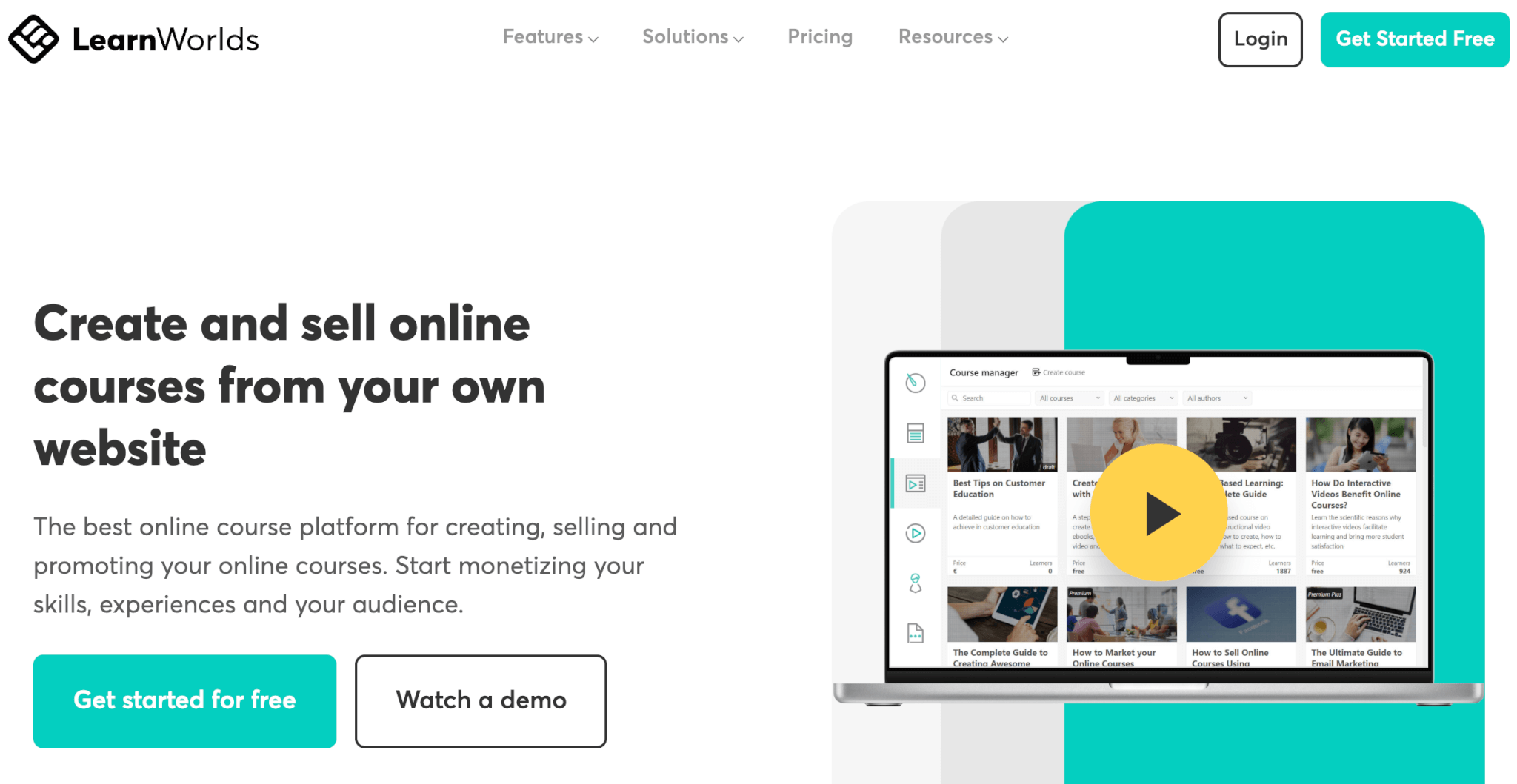
LearnWorlds is a scalable and fully customizable LMS that meets your evolving training needs.
Offering the most flexible course builder in the market, countless integrations, and the most enriched list of vital features, LearnWorlds is your one-stop solution to deliver training to a worldwide audience.
Choose or mix ILT programs, cohort-based learning, hybrid/blended learning, or entirely self-paced depending on your audience.
LearnWorlds enables you to build your own website and supports white labeling and full customization. Apart from the platform’s 4000+ available integrations, you can also build custom integrations through API and Webhooks.
Other features you’ll love are robust reporting and course insights, the certificate builder, and extensive assessment options to ensure you’ve met your compliance goals.
With strong security features, like SSO, data encryption, GDPR compliance, and many more, you can rest assured all data is stored securely from prying eyes.
💁 Check out all of LearnWorlds’ features here
LearnWorlds is the only 100% eCommerce-ready LMS on this list without lacking any of the features you need to provide interactive and engaging learning.
Here are some of LearnWorlds’ eCommerce features that stand out: integration with multiple payment gateways, email marketing tools, shopping cart, and affiliate and referral marketing.
You can sell memberships, course bundles, and digital downloads and create coupons and discounts, offer flexible payment plans and BN/PL options, coupons, and more that you can explore here.
It’s also one of the few LMSs that enable you to build your own branded mobile app.
Pros
Cons
Pricing plans
LearnWorlds offers 4 pricing plans (with a 20% discount when billed annually) and a 30-day free trial.
*Pricing information was retrieved from LearnWorlds on May 22, 2023.
2
TalentLMS
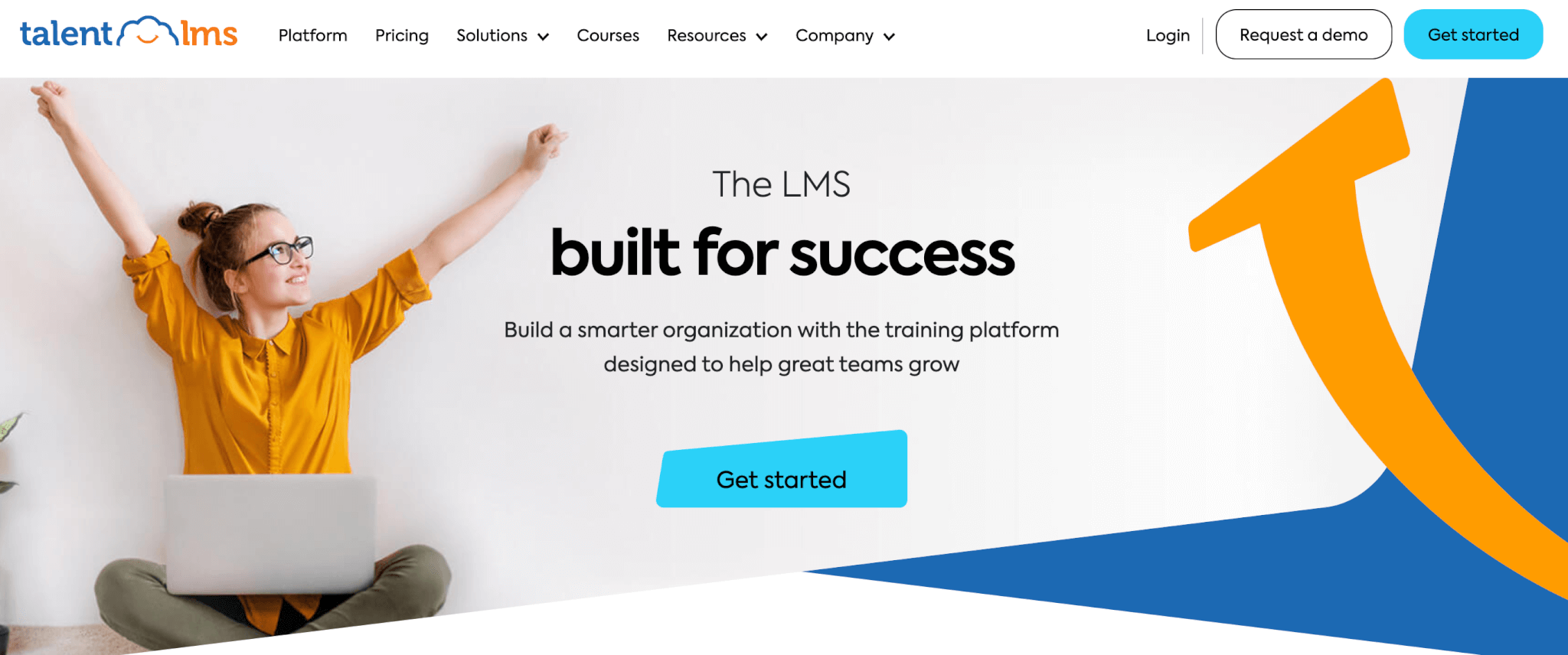
TalentLMS stands out for its intuitive, user-friendly User Interface that enables administrators and learners to navigate it with ease.
It’s a scalable LMS that can successfully meet the needs for extended enterprise training for companies of any size, as its clients include large companies.
With rich gamification features, integrations with video conferencing tools, and support for interactive content, TalentLMS promises an engaging training experience.
It can also help with your compliance management goals with real-time and custom reports, auto-assign, expiring certificates, and more.
The built-in library with off-the-shelf content may also come in handy for soft skills training.
On the downside, TalentLMS doesn’t offer a white-label mobile app, though it does offer a TalentLMS app to host your course. It’s also not the best solution if you’re looking to sell your course.
Although it offers some basic eCommerce functionalities, like integration with payment gateways and email marketing tools, it lacks advanced marketing features like affiliates, upselling capabilities, advanced sales reports, and advanced pricing options.
Pros
Cons
Pricing plans
TalentLMS has a free plan that supports up to 5 users and 10 courses maximum. It offers two types of paid plans, standard and active, as follows:
Standard plans:
Active plans:
*Pricing information was retrieved from TalentLMS on May 22, 2023.
3
Adobe Learning Manager
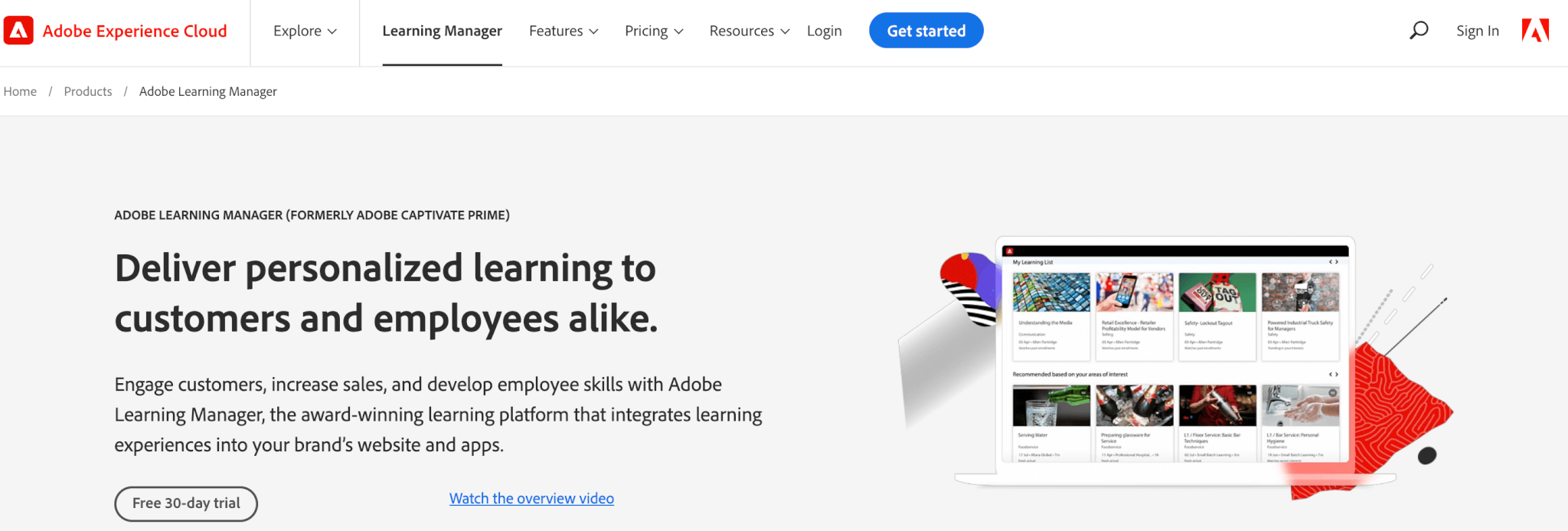
Formerly known as Adobe Captivate Prime, Adobe Learning Manager offers a modern, single web page architecture user interface, making course creation dead simple. It’s best suited for small-to-medium-sized businesses.
The platform makes AI-based recommendations based on the users’ profiles and preferences, further personalizing the learning experience.
It does a good job with compliance management – you can issue certifications and access several reports and a compliance dashboard for a quick overview of the company’s compliance status.
Adobe Learning Manager also takes your data security and privacy very seriously and has won multiple CSO50 awards for its innovation in securing its cloud solutions.
Adobe Learning Manager offers an iOS and an Android app, although some customers complain about the User Interface of the app being inconsistent.
There are also several complaints about customer support being slow or ineffective. Lastly, the platform doesn’t have any real built-in eCommerce capabilities but needs to be integrated with Adobe Commerce.
Pros
Cons
Pricing plans
Adobe Learning Manager offers two plans, one based on Registered Users and the other on Monthly Active Users (recommended for partner training and customer education). The pricing is custom and isn’t mentioned on their website.
*Pricing information retrieved from Adobe Learning Manager on May 22, 2023.
4
360Learning
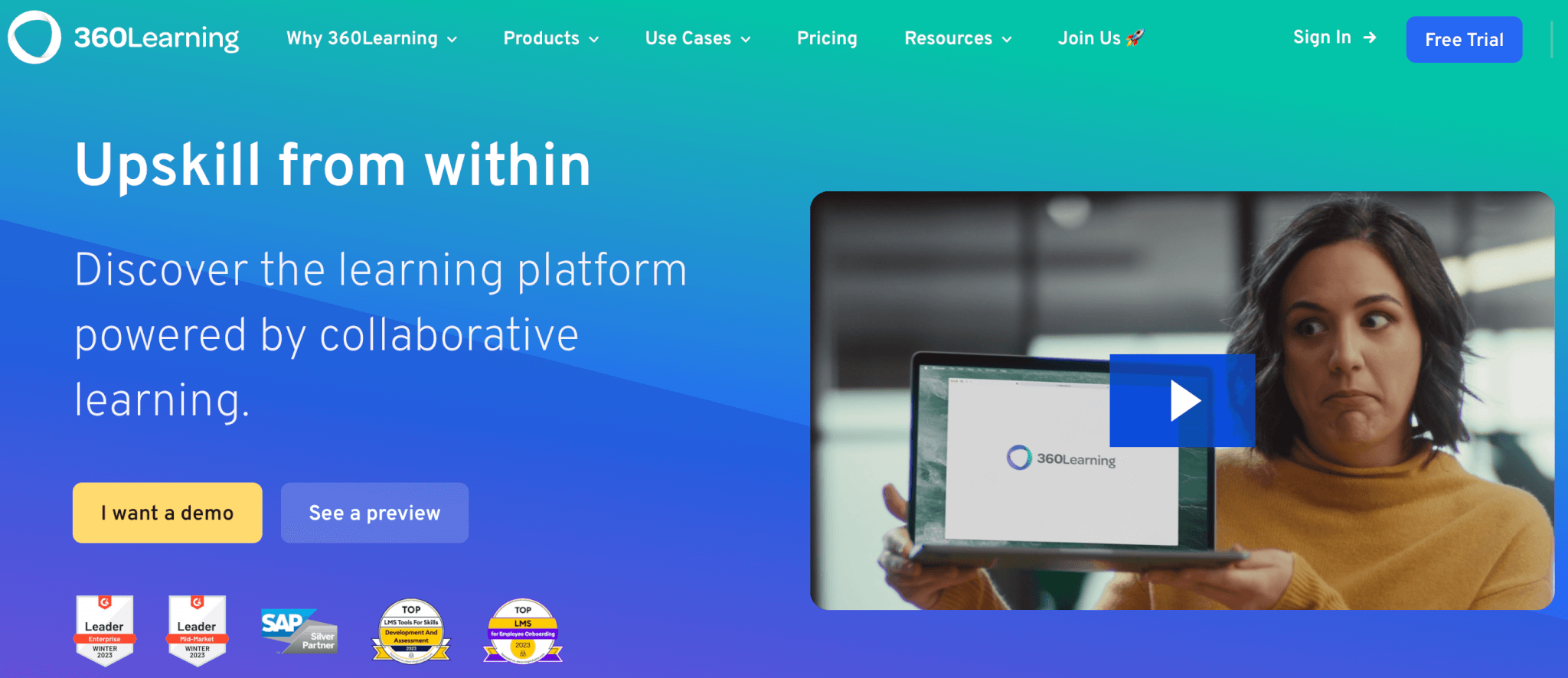
360Learning is an LMS that leverages collaborative learning for personalized and engaging learning experiences.
The platform supports several integrations and APIs for flexibility in customization. It also features a built-in authoring tool for easy course creation and offers off-the-shelf courses.
360Learning has a unique feature that enables real-time declaration and upvoting of training needs to help you build more relevant training.
It also has features to facilitate the quest for the right subject matter experts within a company.
User management is made easy, as you can segment users into groups and set access levels accordingly.
360Learning provides its own mobile app for you to host your course and customize the branding, but you can’t build your own.
Although it offers some basic eCommerce features, like integration with payment gateways and email marketing tools, it lacks advanced marketing tools. And you can’t build your own separate website to sell your course.
Pros
Cons
Pricing plans
360Learning offers a Team plan for up to 100 users at $8/mo for every registered user with a 30-day free trial. For more than 100 monthly users, it offers a Business Plan with custom pricing.
*Pricing retrieved from 360Learning on May 22, 2023.
5
Docebo
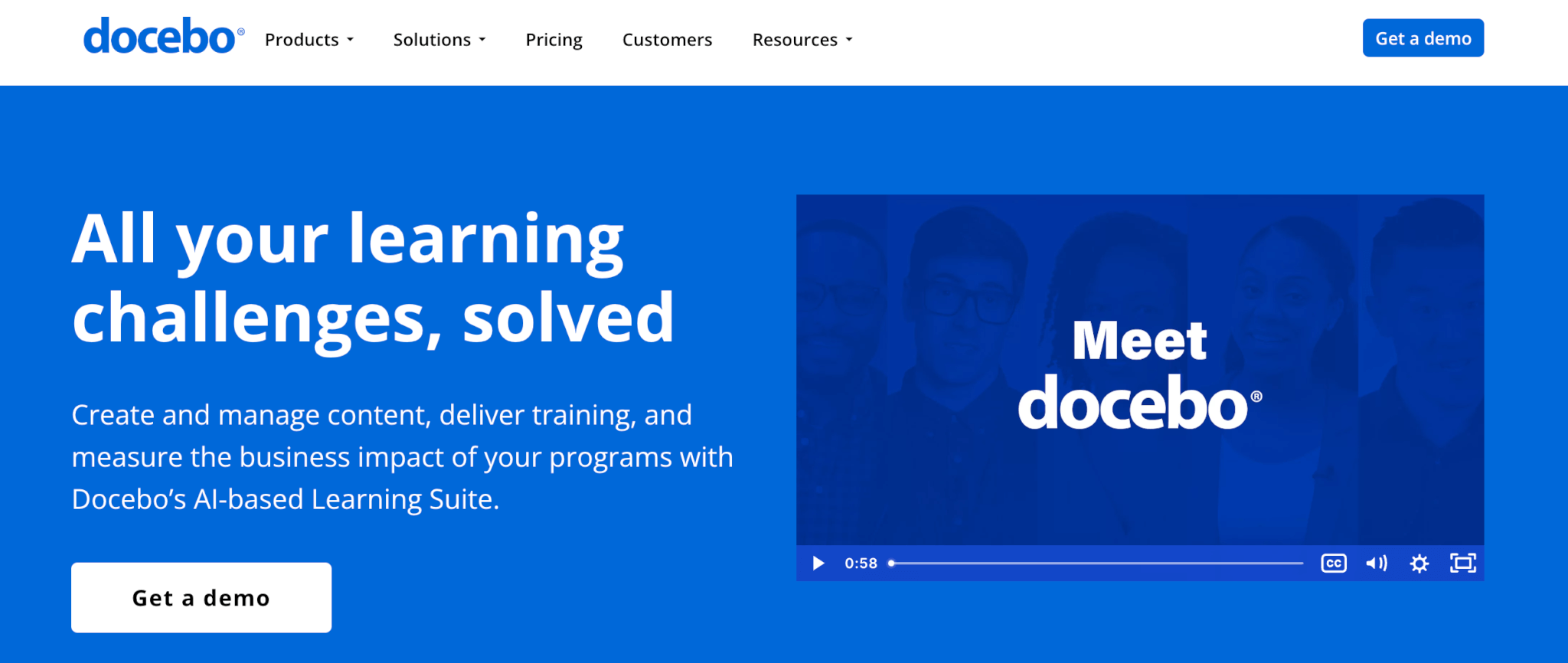
Docebo is a modern LMS that streamlines content creation, management and delivery through a suite of tools and plugins while providing robust tools to measure the efficiency of your training programs.
With Docebo, you can create audience-specific pages and leverage free extensions.
An LMS primarily addressed to companies with 300+ users, Docebo can adapt to meet any training needs, including extended enterprise.
Docebo Skills enables partners to evaluate their own skills. It also enables you to build your own branded mobile app – another standout feature among this list. Through several integrations with sales and marketing tools, it offers some basic eCommerce capabilities.
That said, the initial setup can be a bit tricky, considering that Docebo is a suite of different tools rather than one standalone platform. Several customer reviews mention that the product is more expensive than similar LMS solutions.
Pros
Cons
Pricing plans
Docebo offers customized pricing plans based on the number of active users.
Pricing plans are not disclosed on the Docebo website.
GyrusAim
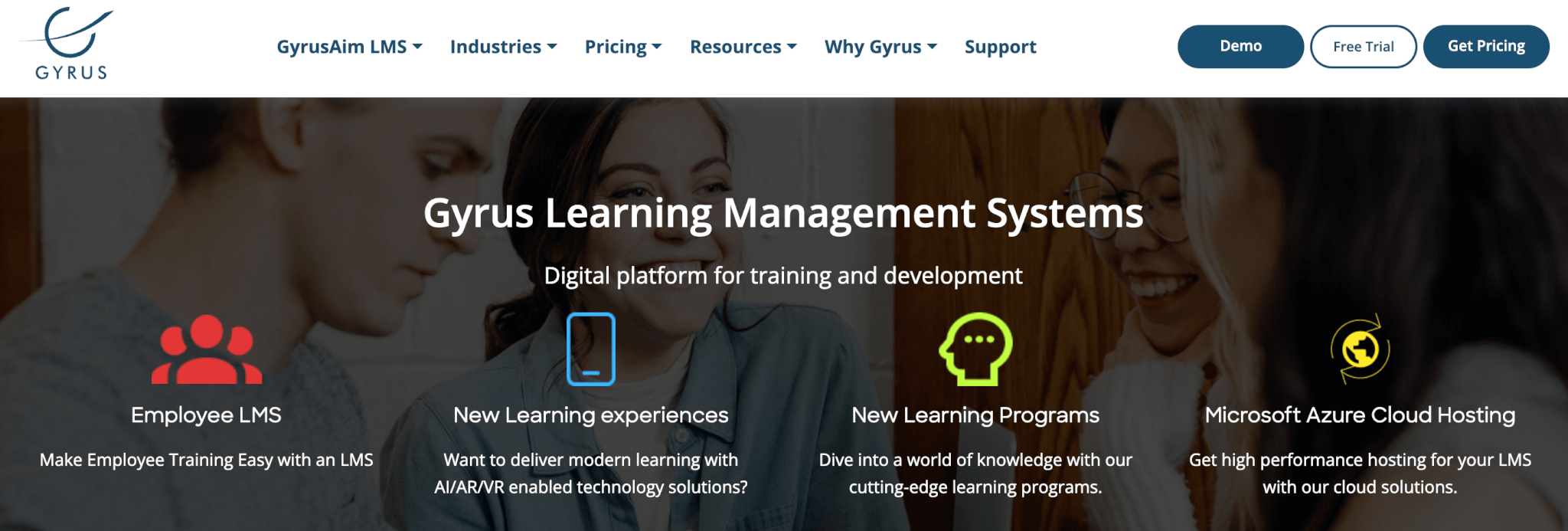
GyrusAim is a scalable LMS that can successfully meet your extended enterprise training needs with robust compliance management and reporting features, skills gaps and training needs analysis tools, and a built-in assessment engine.
GurusAim has its own mobile app where you can host your courses, yet no capability to build your own website or any integrations with sales and marketing features.
Integrations are overall very limited, focusing on video conferencing tools.
Pros
Cons
Pricing plans
GyrusAim offers customized pricing plans depending on the number of active users who will enroll within the system monthly.
Pricing plans are not disclosed on the GyrusAim website.
7
Tovuti LMS
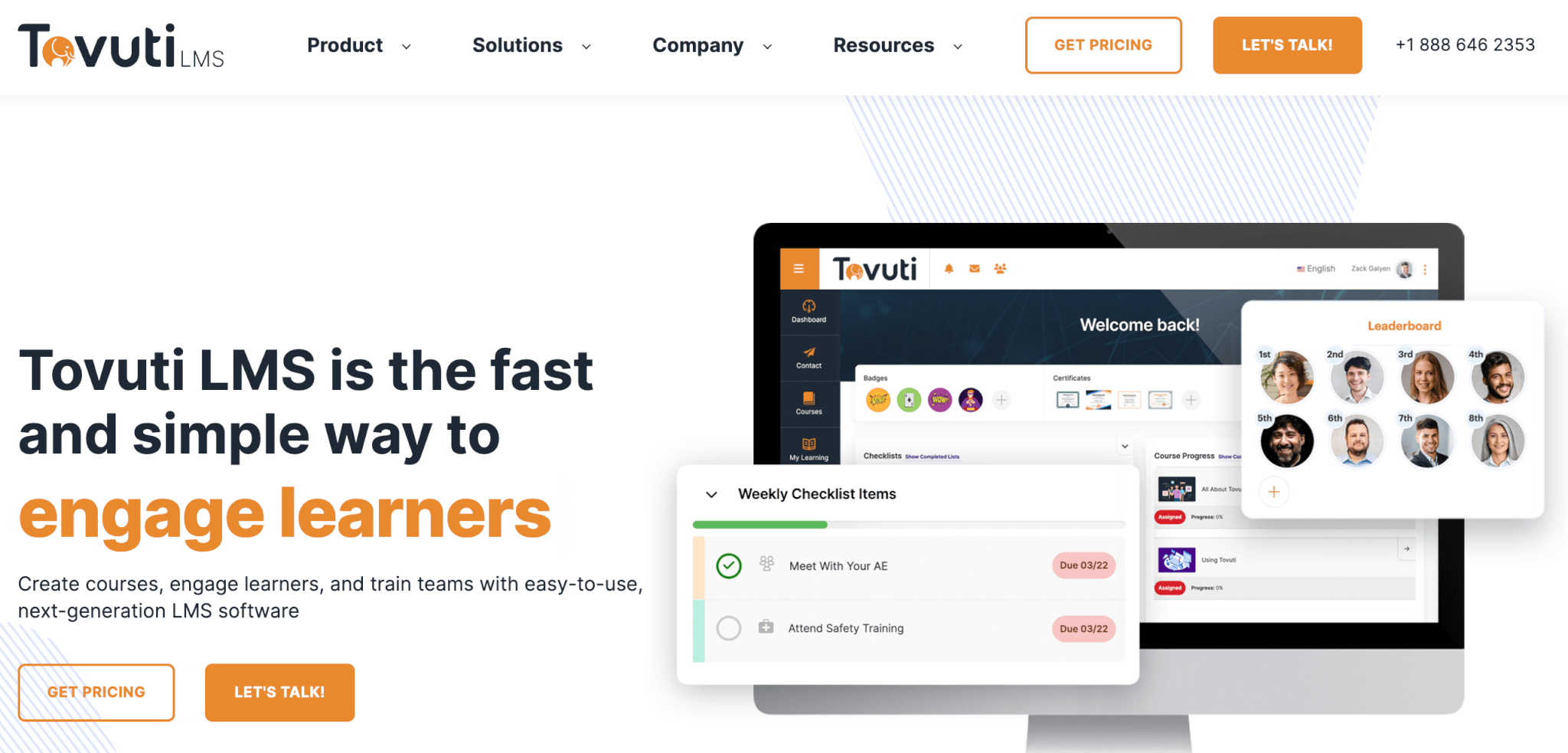
Tovuti is an intuitive and scalable LMS that offers built-in authoring tools, simplifying the course development process and eliminating the need for third-party content creation tools.
It allows you to manage access to courses and functionalities based on user roles.
The platform has strong security features, such as SSO, multi-factor authentication, data encryption, while it’s also compliant with GDPR, CCPA & HIPAA.
Tovuti enables you to build engaging and social learning experiences with multimedia content and features that promote collaboration, like whiteboards, participation controls, and more.
The platform is mobile responsive, and you can also build your own branded mobile app.
Another interesting feature is the customized learner portal, where learners can view everything that concerns them, from courses to upcoming events.
That said, Tovuti LMS offers very limited eCommerce features, supporting some payment gateways and enabling you to sell courses or subscriptions. Assessments are also limited to just a few question types.
Pros
Cons
Pricing plans
*Tovuti LMS doesn’t offer pricing information on its website. Pricing information retrieved from G2 on May 22, 2023.
8
Cornerstone Learning

Cornerstone Learning is an LMS that focuses on self-directed learning skill building and training that is connected to career goals.
It’s a scalable LMS that supports different types of content and delivery methods and enables you to launch different microsites for your different courses for partner training.
It’s GDPR compliant and has several security features and access controls in place to ensure the data privacy of your users.
This platform places emphasis on skills development with relevant features like automatic skill insights (Skill profiles) and content tagging.
The Cornerstone Skills Graph can develop a rich skill profile for each of your people with only a job title and resume. Learners enjoy personalized learning paths based on their skills and interests to maximize engagement.
Cornerstone Learning is mobile-friendly and has its own mobile app, but you can’t build your own.
Many customer reviews also mention that the user interface is outdated and complex, and that customer support is unresponsive.
Pros
Cons
Pricing plans
Cornerstone Learning doesn’t disclose pricing plans on its website.
9
LearnUpon
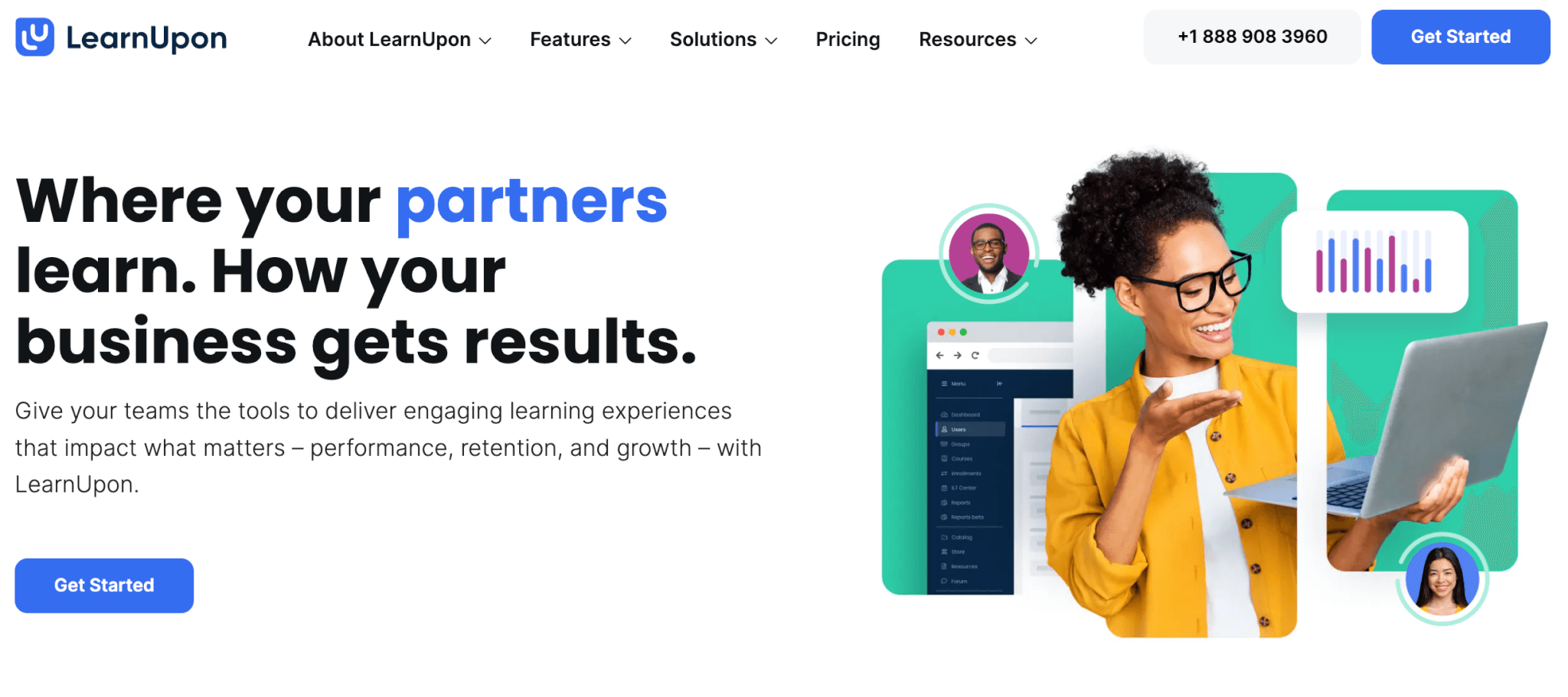
LearnUpon is a versatile, scalable LMS that can meet different training needs, including extended enterprise training. LearnUpon has learning portals, which are customizable learning environments.
You can build as many as you want to accommodate different partners, using your branding and custom URL, and easily share content between portals for faster course creation.
LearnUpon facilitates user management in multiple ways, through bulk actions, self-registration, and integrations with CRM and HRIS tools so that new users are added to the LMS, as they are added to the other systems. It features user types to control permissions.
This LMS has exceptional security, with SSO, data encryption, GDPR compliance, SOC 2 compliance, and ISO certification, among others.
It has a built-in shopping cart, but apart from that, it doesn’t have any strong eCommerce features even as integrations.
Overall, the number of integrations is limited, although you can build your own with the LearnUpon API. The quizzing functionality is also rather basic.
Pros
Cons
Pricing plans
LearnUpon doesn’t disclose pricing information on its website.
10
Litmos
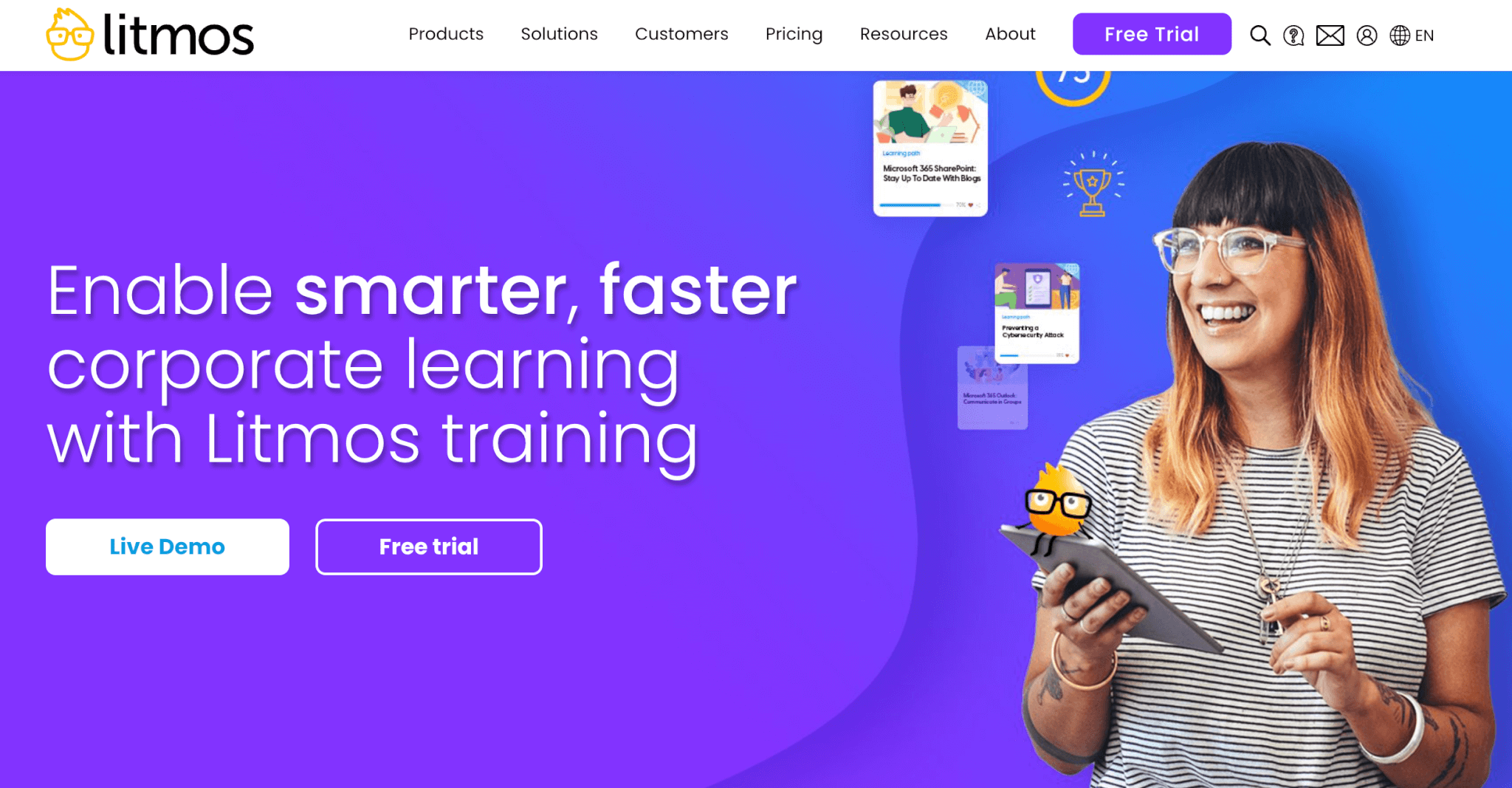
Litmos is LMS equipped to support extended learning and different audiences with 35+ preconfigured languages, advanced security features, off-the-shelf content, and robust analytics. The built-in authoring tool speeds up the course creation process.
Litmos has partner-focused features like video assessments and “boosts” to reinforce knowledge.
It offers a fair amount of integrations to facilitate eCommerce functions, video conferencing, and email marketing, as well as API and 50 connectors for absolute flexibility in customization and scalability.
Customer reviews mention that the user interface is rather complicated, especially when it comes to the report center. The customer support is also a bit disappointing and slow to respond.
Pros
Cons
Pricing plans
Litmos offers three different pricing plans and a 14-day free trial, though it doesn’t disclose specific pricing information on its website.
11
Absorb
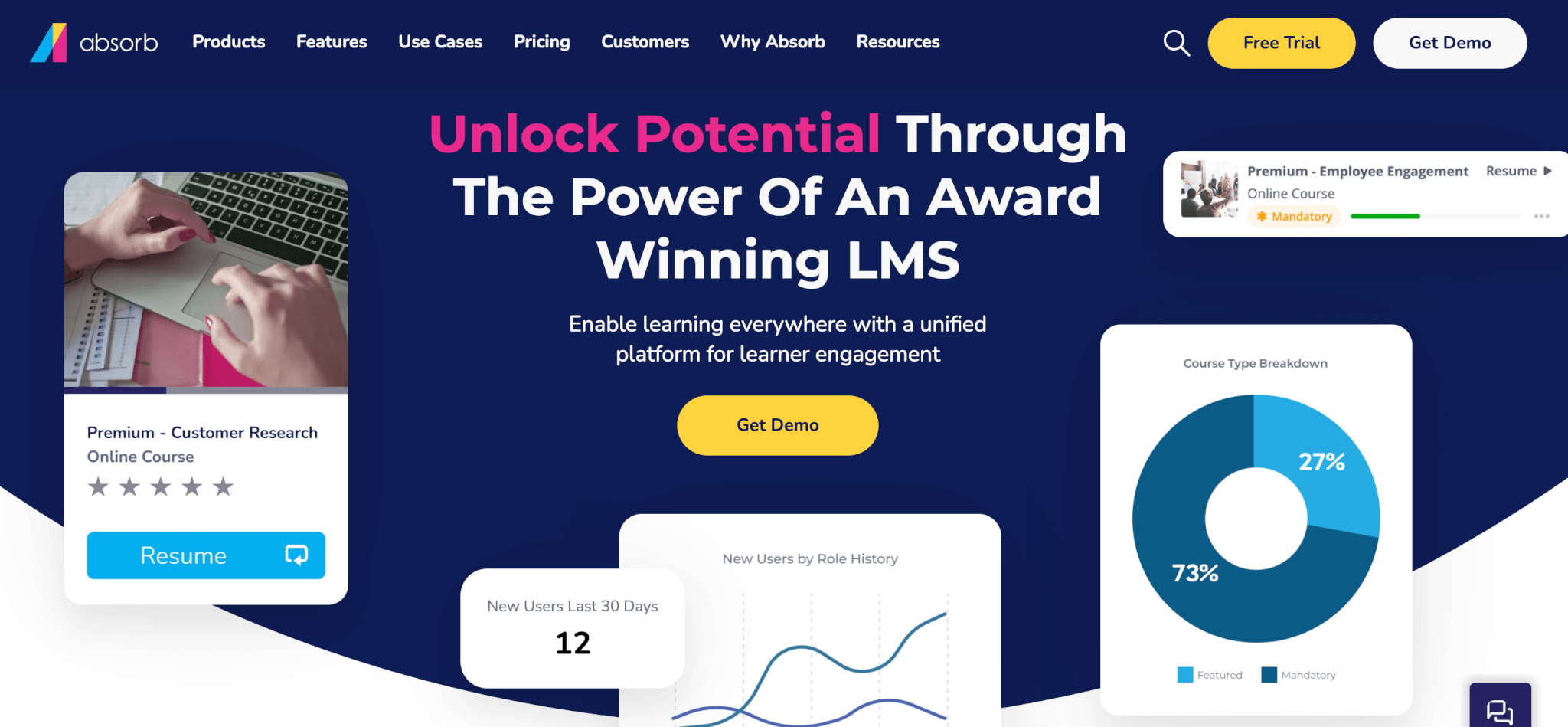
Absorb enables you to build engaging learning and connect training directly into your employees’ workflow.
Mobile learning is supported via the LMS app, with offline access to content and automatic sync.
Absorb supports multimedia and training delivery methods and stands out for its exceptional customer service and robust security features, like user roles, and is compliant with GDPR, SOC 2, and WCAG 2.0 requirements.
The Learner Dashboard shows learners AI-powered recommendations and trending courses.
Absorb is also eCommerce-ready with a built-in shopping cart, it enables you to build a branded sales page, and supports custom integrations.
Absorb’s reporting capabilities are not very strong, which could be a problem if you have complex compliance requirements. Also, it takes about two weeks to set up the implementation process.
Pros
Cons
Pricing Plans
Absorb LMS doesn’t disclose pricing information on its website.
12
eFront Learning
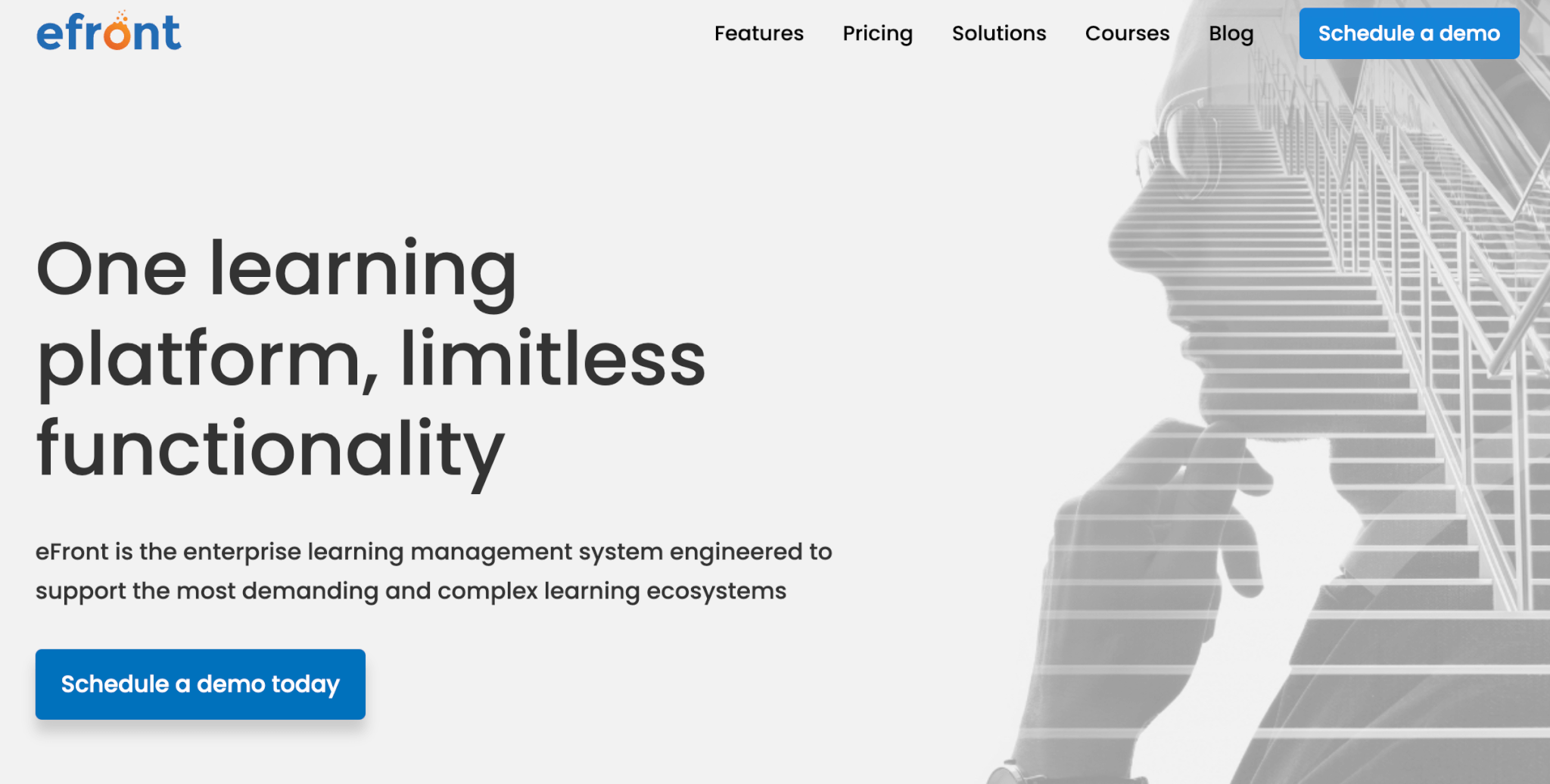
eFront is strong in security features and can support the most intricate learning ecosystems. It has multiple integrations and APIs for maximum flexibility and customization.
With features like multi-tenancy, skills gaps assessments, audiences, and reporting, it’s an enterprise-ready LMS, suitable for training external audiences.
It’s ISO-certified and GDPR compliant, and has reliable security features, The learning environment can be customized and is fully white-labeled to match your branding.
eFront is a good option for compliance training with efficient certificate management, assessments, and reporting. It offers easy course management with the ability to pull content from your course library or clone units and allows you to create customized learning paths and curriculums.
It doesn’t offer a branded mobile app, but it is mobile-friendly. It also has native integrations with payment gateways to facilitate eCommerce functions, though it is not its primary focus.
Although the platform’s user interface is intuitive, it appears to be somewhat outdated.
Pros
Cons
Pricing Plans
eFront offers one plan for up to 1000 registered users at $1200 per month billed annually (or 1800 with access to TalentLibrary). For over 1000 users, it offers custom pricing.
* Pricing information retrieved from eFront on May 22, 2023.
13
Eloomi
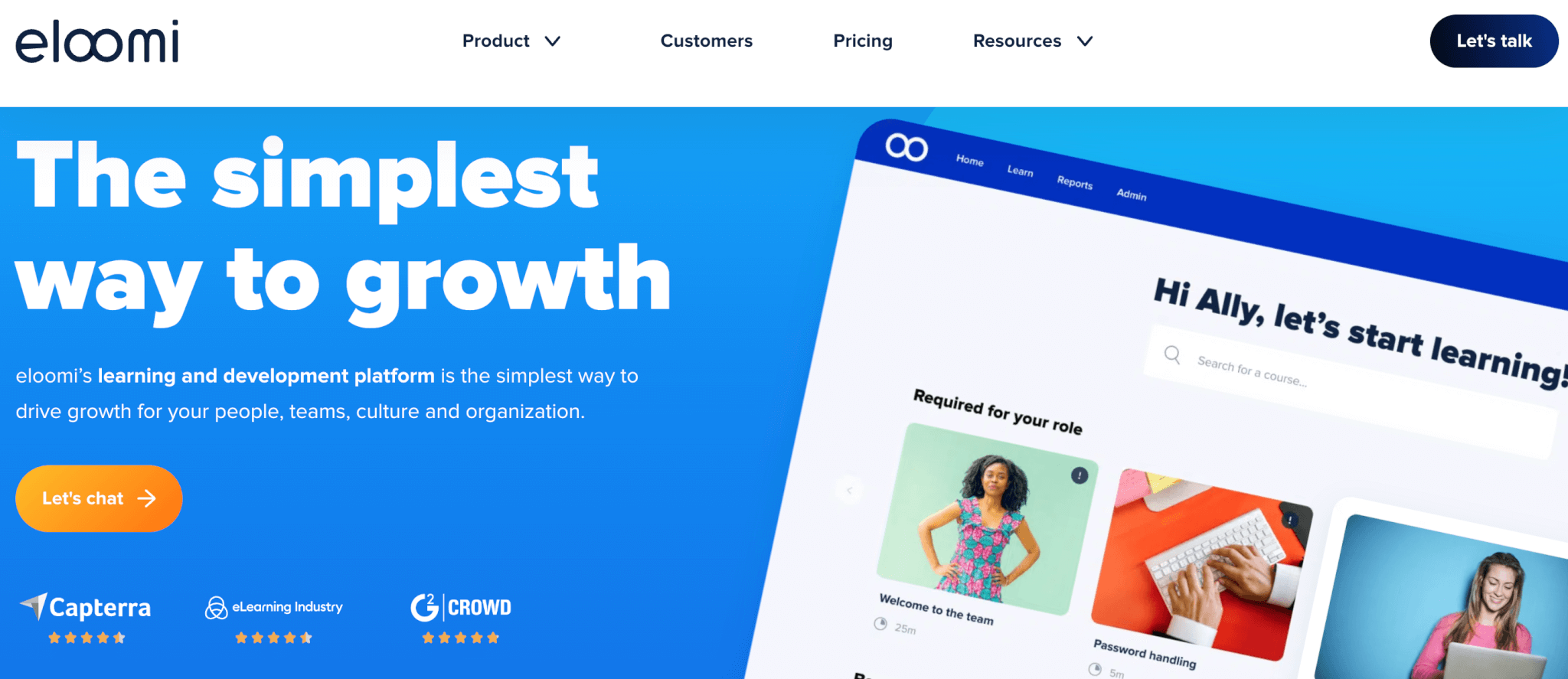
Eloomi is an LMS/LXP platform with a built-in library of on-demand content you can group into playlists and connect to specific skills.
The platform allows you to create personalized goals and learning paths. You can create courses from scratch, upload existing ones, or pick from the content store.
Eloomi offers a mobile app and integrates with HR tools, but also supports APIs for further customization options.
It’s not eCommerce ready as it has no direct integrations with any sales and marketing tool, or payment processors. Its quizzing and reporting functionalities are rather basic.
Pros
Cons
Pricing Plans
Eloomi offers custom pricing and it doesn’t mention specific pricing information on its website.
14
Paradiso
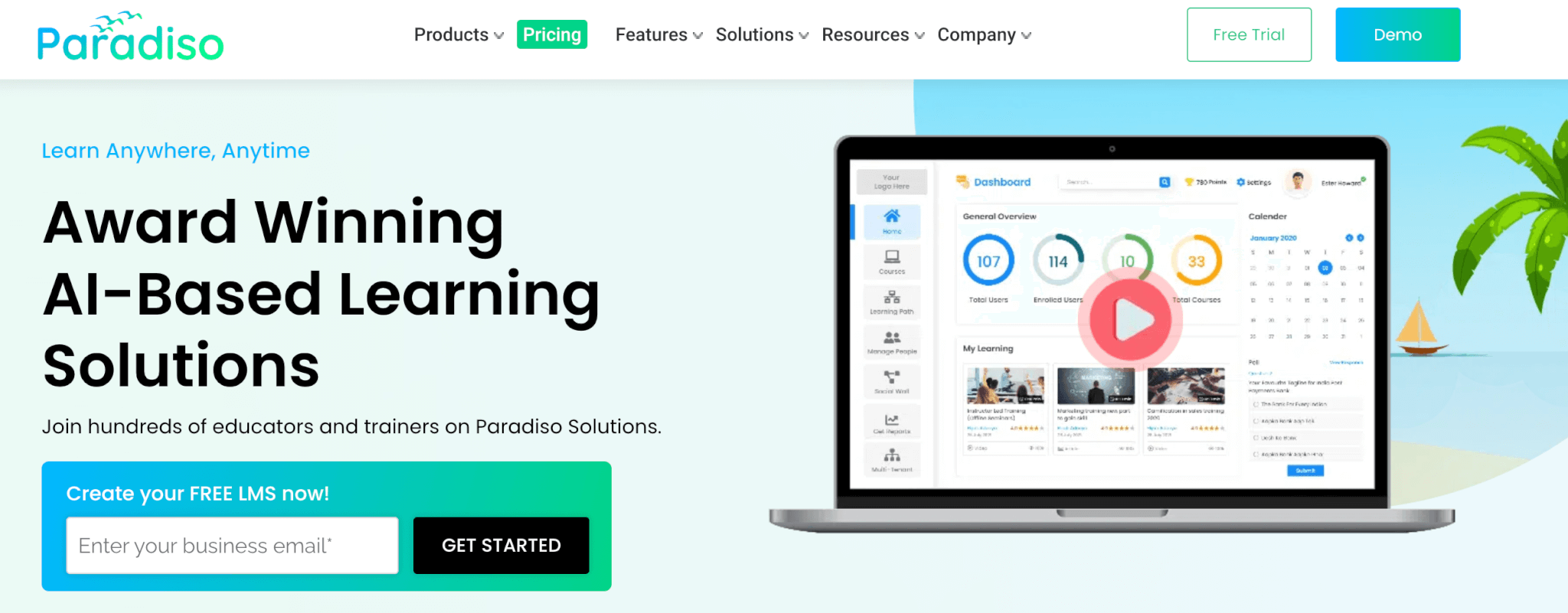
Paradiso is a scalable training platform that can be deployed either on the cloud (SaaS) or on-premise.
It has a built-in authoring tool and video conferencing, while offering an extensive course catalog with off-the-shelf learning content. Paradiso supports multi-tenancy and flexible training delivery methods and has a powerful reporting tool – perhaps its strongest asset.
Although it has multiple integrations, some customer reviews mention that installing those has been a complex and slow process.
Overall, navigation is complex, and the site is slow.
Although it integrates with eCommerce platforms, like Salesforce and Shopify, it lacks email marketing tools.
Pros
Cons
Pricing Plans
Paradiso has different pricing plans according to the number of users, but pricing information is not disclosed on its website.
Sealing the Deal: Deciding on the Strongest Option
When it comes to extended enterprise training, choosing the right Learning Management System (LMS) is crucial for streamlining training across various partners and customers.
LearnWorlds goes beyond delivering efficient training to your extended enterprise partners, regardless of their location, while accommodating their individual learning preferences𑁋it empowers you to provide seamless and engaging learning experiences for all stakeholders.
To experience the benefits firsthand, we invite you to take advantage of our 30-day free trial to start building your path to success with LearnWorlds today, and unlock the full potential of your extended enterprise training program.
9000+ brands trust LearnWorlds to train their people, partners & customers.
Start a FREE TrialFurther reading you might find interesting:

Androniki Koumadoraki
Androniki is a Content Writer at LearnWorlds sharing Instructional Design and marketing tips. With solid experience in B2B writing and technical translation, she is passionate about learning and spreading knowledge. She is also an aspiring yogi, a book nerd, and a talented transponster.

